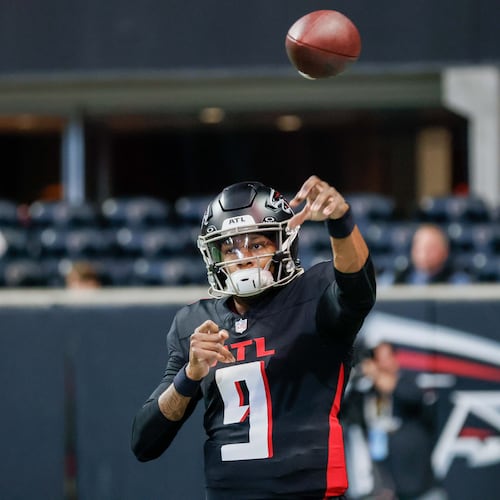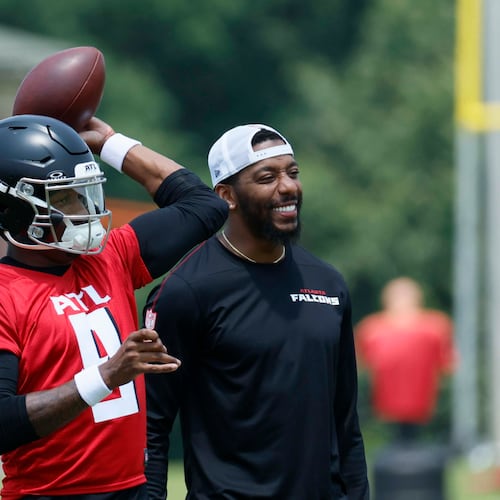With their 22-10 gritty victory over the Carolina Panthers on Sunday, the Falcons finished the regular-season 10-6 and earned the sixth and final playoff berth in the NFC playoffs.
The Falcons (10-6) will play the Los Angeles Rams (11-5), the NFC West champs and the No. 3 seed, at 8:15 p.m. Saturday at the Los Angeles Coliseum.
The Falcons lost to five playoff teams (Patriots, Vikings, Bills, Saints and Panthers) and the Dolphins. If they had defeated the Dolphins, they would have won the NFC South and would be playing at home as the No. 3 seed.
But who’s quibbling now. They are in the playoffs for the second consecutive season for the second time in franchise history.
The only other time the Falcons went to the playoffs in back-to-back seasons was in 2010, 2011 and 2012 under Mike Smith.
Here are the five reasons why the Falcons made the playoffs:
1. The defense. A team that was built to perform on offense, now has a top-10 defense. The Falcons spent $90.7 million on the offense and $59.1 million on the young defense, which continued to improve this season.
The defensed finished the regular season ranked eighth in scoring defense (21 points per game) and 10th in total defense (323.1 yards per game). The defense finished eighth in rushing defense (105.2 yards per game) and 12th in pass defense (217.9 per game).
The Falcons have not ranked in the top 10 in scoring defense and total defense since the 1998 season, when the Falcons went to the Super Bowl.
2. Deion Jones is emerging. The quiet second-year linebacker started to spread his wings more in 2017.
He had a spectacular shoestring tackle on Seattle’s Russell Wilson that likely kept the Seahawks out of field-goal range for a game-winning kick in a 34-31 victory Nov. 20.
Against the Saints on Dec. 7, he preserved another victory with a game-saving interception in the end zone. He soared so high that he nearly flipped over before landing on his back.
In the regular-season finale, he took on the challenge of helping stop Carolina quarterback Cam Newton and rookie running back Christian McCaffrey. Jones finished with 10 tackles.
Jones, who some believe was snubbed for the Pro Bowl, leads the defense with 138 tackles. He is a Pro Bowl second alternate.
“I think there will be plenty of (Pro Bowl selections) in his future,” Falcons coach Dan Quinn said. “He’s a real emerging player in this league.”
3. Quinn motivational tactics. Quinn's motivational tactics helped the team start the season fast, pulled them through some tough times and had them in position to finish the season strong.
Quinn, through a firm called Vision Pursue, has his team trained in the concepts of mindfulness and meditation.
Also, Quinn masterfully uses motivational clips from football, basketball and boxing to help get his team focus.
For the Carolina game it was the story of Willis Reed and the 1970 New York Knicks. For the Saints, it was about a boxing match between Arturo Gatti and Mickey Ward.
Quinn’s blend of mindfulness and doggedly demanding that the Falcons focus only on the game in front of them, helped them to shake the Super Bowl hangover and make it back to the playoffs.
They still have a mountain to climb to atone for the 28-3 Super Bowl collapse, but they are at least back in the playoffs.
No Super Bowl losing team has returned to the big game since the 1994 Buffalo Bills.
4. Offensive firepower. The Falcons, while taking teams' best shots under first-year coordinator Steve Sarkisian, still had enough firepower to cobble together 10 wins.
Quarterback Matt Ryan, wide receiver Julio Jones and running back Devonta Freeman did a lot of the heavy lifting. Tevin Coleman did his share and stepped in admirably when Freeman was out for three games in the NFL concussion protocol.
Center Alex Mack held the line together, which started three different combinations after starting the same players in all 19 games in 2016. Wes Schweitzer, the new starting right guard, improved as the season progressed and Ben Garland, a mauler, filled in for Andy Levitre for four games.
Ryan went over the 4,000-yard passing mark in the final game. It marked the seventh consecutive season of passing for more than 4,000 yards, which is tied for the second-longest active streak in the NFL and the third longest in NFL history.
Jones took the fewest games in NFL history to record over 9,000 receiving yards with a 14-yard reception in the third quarter against the Panthers.
It took Jones just 95 games to reach 9,000 yards receiving milestone, passing San Diego’s Lance Alworth (98 games), Detroit’s Calvin Johnson (102), St. Louis’ Terry Holt (105), Pittsburgh’s Antonio Brown (107) and Minnesota's Randy Moss (107).
While Freeman didn’t get 1,000 yards rushing for the third consecutive season he was still productive. He essentially played in 13 games (he left the Dallas game on the second play). He had 1,182 yards from scrimmage (865 rushing and 317 receiving) and scored eight touchdowns (seven rushing, one receiving).
5. Clutch kicker. Matt Bryant, 42, just keeps on ticking and keeps on kicking.
He went 5-of-5 against the Panthers, which was the most field goals he’s made in a game this season. Bryant also made a 56-yard field goal, which was the second-longest field goal of the season.
Bryant's 1,029 points since joining the Falcons in 2009 rank third in the NFL over that span.
He made 34 of 39 field-goal attempts this season, including 8 of 9 from 50 yards out or more.
“Clutch,” Julio Jones said. “He’s amazing. We can always count on him.”
About the Author
Keep Reading
The Latest
Featured



